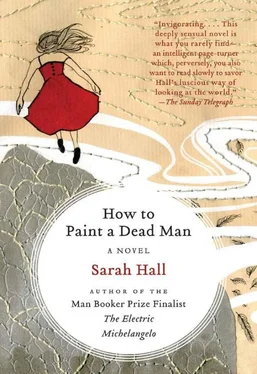Sarah Hall - How to Paint a Dead Man
Здесь есть возможность читать онлайн «Sarah Hall - How to Paint a Dead Man» весь текст электронной книги совершенно бесплатно (целиком полную версию без сокращений). В некоторых случаях можно слушать аудио, скачать через торрент в формате fb2 и присутствует краткое содержание. Год выпуска: 2009, Издательство: Harper Perennial, Жанр: Современная проза, на английском языке. Описание произведения, (предисловие) а так же отзывы посетителей доступны на портале библиотеки ЛибКат.
- Название:How to Paint a Dead Man
- Автор:
- Издательство:Harper Perennial
- Жанр:
- Год:2009
- ISBN:нет данных
- Рейтинг книги:4 / 5. Голосов: 1
-
Избранное:Добавить в избранное
- Отзывы:
-
Ваша оценка:
- 80
- 1
- 2
- 3
- 4
- 5
How to Paint a Dead Man: краткое содержание, описание и аннотация
Предлагаем к чтению аннотацию, описание, краткое содержание или предисловие (зависит от того, что написал сам автор книги «How to Paint a Dead Man»). Если вы не нашли необходимую информацию о книге — напишите в комментариях, мы постараемся отыскать её.
, Sarah Hall, "one of the most significant and exciting of Britain's young novelists" (
), delivers "a maddeningly enticing read... an amazing feat of literary engineering" (
).
How to Paint a Dead Man — читать онлайн бесплатно полную книгу (весь текст) целиком
Ниже представлен текст книги, разбитый по страницам. Система сохранения места последней прочитанной страницы, позволяет с удобством читать онлайн бесплатно книгу «How to Paint a Dead Man», без необходимости каждый раз заново искать на чём Вы остановились. Поставьте закладку, и сможете в любой момент перейти на страницу, на которой закончили чтение.
Интервал:
Закладка:
And, let’s face it, it is exempting — self-employment. Very nice to have time and freedom, and yes, all right, money. Nice to enjoy what you do for a living, and not be dreaming of murder or arson every day in a municipal cubicle. Trips out at milking time on a whim, to an exhibition, to the pipe shop, the matinee, or to see a skull-cluster of stones in a pool at low tide on the coast, are very agreeable. He doesn’t have to get a wash until mid-afternoon if he doesn’t want to. He can read in bed when he wakes up, or listen to Woman’s Hour. Bloody hell-he could wear sling-back, leopard-skin stilettos and arse-jewellery in the studio if he so desired!
Not that there isn’t any order. It isn’t professional anarchy. But from the outside the perks certainly look good-mobility at his own discretion, the absence of a twattish boss, a punch-card, and a starchy uniform. Stovetop espresso five times a day instead of thin metallic tea pissing out of a machine into a plastic cup. Might as well make the most of such privilege. Might as well appreciate it and say he’s lucky. ‘I’m a lucky man,’ he says in interview, ‘getting to do what I do. Don’t think I don’t know that.’ No. He doesn’t have to rush pell-mell round the supermarket after ten hours in a polystyrene office, or be ruthless towards other drivers in rush-hour queues. There might be unusual exchanges with the taxman, there might be days when the Muse is off banging some other artist, but once you’ve got the hang of the credit system, once you realise Miss Mnemosyne will come back after her dirty little affair, things do get a lot easier.
Yes. It is a pleasure, putting on a coat, midday, mid-week, and walking to the cairn at the summit of the old corpse road. It’s a joy, being in his workable home, with its mismatched, notched crockery and under-door draughts, the brisk accessible kettle and the sagey deodorant of Lydia lingering if she’s just passed through the room. But he’s earned the bastard lot! He’s earned it with dedication, long hours, lost weekends, rejections, ridicule, out-of-voguery, and taking an enormous bloody punt and being nifty with a brush and sticking at it. Dues have been paid. He’s risked a risky profession, and it’s paid off. And for that he is proud, and for that he doesn’t mind Rob Robertson’s playful rebuke. It’s not like he hasn’t worked a million shitty jobs before the only one he ever wanted eventually became his. Barkeep, road sweeper, sausage packer, cleaner, fly and lure seller, bastard rent collector, toyboy. Not like he hasn’t been skint as a rag-and-bone man. Not like he isn’t intimately acquainted with the fag end of the country’s social order-the weak broth, the pneumoconiosis, the booze, the glory-hole of working class solidarity.
But. He’s not complaining. Not today anyway. Not with this gilding, long summer light, and the promise of severe, photogenic shadows in the ravine. Sitting behind a sloppy armada of cows is not much to have to contend with really. He is a patient man. He is accustomed. He’s groovy.
Fed up with itself, the car stalls. He turns the engine over a couple of times until it fires. A dirty tubercular cough splutters from the exhaust pipe. Rob Robertson looks back over his shoulder and the wall-top rooks swivel their beaky faces to admonish the disgraceful noise. Haughty buggers — they’d have his eyes out too given half a chance! On the moor, foxgloves are rising from the charred ruins of the bushes that have been burnt back, and the whin smells sweet. Cuckoo-pint is growing along the slopes of the vallum. He wonders if the nettles are too tough now to make a pudding — he’s had a recipe stuffed in a drawer in the studio for years that he’d like to try. So many things still to do, eh Peter. ‘There’s no such thing as ennui, except for the lobotomised,’ he tells Susan and Danny when they complain about being bored. He’s never bored. Although these cows are beginning to test his chipper reserves.
Lydia’s red VW is trundling back over the road in the distance. At a fair old lick is how his wife drives. Round the corner by the farmyard she comes, over the cattle-grid with a loud metal thrum, over that bump where the concrete kinks — the car pitches sharply up, and quickly nods down. ‘Oooh, the suspension! Careful, love!’ There’s the whingeing of brakes, and then she’s lost from sight on the other side of the black-and-white herd.
Lydia accompanies him on trips out sometimes, now the kids are self-sufficient and mostly elsewhere. Together they travel light, carrying small rucksacks of equipment instead of papooses. If he’s walking up a fell, she’ll sometimes join him, or she’ll cut down to the nearest waterway in search of rarities, taking her camera with her. Other days he leaves her to her own machinations at home, carried out under the cover of chores, behind the tent of bright cottons on the washing line or in amongst the jams. ‘I think I’ll mooch about at home today’, she’ll say, her grey eyes already mulching paper in a bucket or stripping varnish from a salvaged bureau as they look up at him. ‘Right-o, cheerio, love, good luck with the japanning,’ he’ll say, planting a big clumsy kiss on her face that misses her lips and squashes her nose.
When he gets back she’ll have developed a roll of photographs in the pantry; they’ll be dripping chemicals on to the floor, drumming the wax-paper lids of jars. The vegetable patch will be dark with freshly turned sods, carrots left clarty in the sink for him to scrub. She’ll have added denim patchwork pieces to his holey dungarees, or expanded the quilt hanging in the little upstairs room that used to be Susan’s, and is Susan’s again until she moves, along with prosaically blacking the hearth and splitting kindling. He never knows where she finds the time for everything.
He suspects, no, let’s be honest, he knows, that it’s not him Susan gets her organising skills from — her tidiness and productivity — and her natural instinct for dark rooms. He and Danny can’t stand that whole thing — the claustrophobia, the shrewy optics, the tortuous pong. But the Caldicutt women seem immune. Already their daughter is attracting attention with her work, has walked straight into the best art school in the country, has received a decent amateur prize with which she has bought a classy camera. Clever lass. She is what her brother calls the brains of the operation. Why is it then he worries most about her? Why doesn’t he stress so much about Danny, who is, like his old man, a drop-out, who has been in gentle trouble with the law for possession and distribution of the herb, who is as flaky as chocolate and has decided to steward the summer music festivals and live like a pauper for the rest of the year? She’s the one on the fast track, off to Goldsmiths any day now. She’s the one with ambition, the gumption, the get-up-and-go. Why then does he worry about the pull of her strings?
Movement. Suddenly the road up ahead is visible. The cows have docked in the corrugated shed. There’s Lydia in her scarlet bug, revving it up, spinning grit. He puts the car into sticky forward gear and pulls away with a squeal. The doomsday hares, having returned to the road like the plague, scarper again. His wife, sitting with plenty of air between her spine and the seat, holds her hand up and zips by him. ‘How was yoga?’ he calls.
Five o’clock at the Gelt ravine. He parks on the verge above, skirts round the edge of the crags and sets his caddy down on a shelf of rock. This time of year the darkness in the crevices has the consistency of creosote as shadows spool into the valley below. The face of the gorge is like a gothic portrait, like the Sargent painting of Stevenson. It makes him think about Donald, with his long hair worn over his face to cover the scars from the accident on the roof with the bitumen. He’s often wondered how it must have felt, to have his skin scalded off like that. Terrible. Medieval. Poor old Donald. It took years for him to start going out in public again, and then he insisted on using his brown locks to mask the damage. Even longer for him to start doing readings again. The burn has healed well over the years; when he tucks his hair behind his ear, Peter can see the slow, yellow recovery. But the damage is vast. Donald doesn’t drive, not because he’s a woolly poet, but because his right eye is missing, and he has no depth perception.
Читать дальшеИнтервал:
Закладка:
Похожие книги на «How to Paint a Dead Man»
Представляем Вашему вниманию похожие книги на «How to Paint a Dead Man» списком для выбора. Мы отобрали схожую по названию и смыслу литературу в надежде предоставить читателям больше вариантов отыскать новые, интересные, ещё непрочитанные произведения.
Обсуждение, отзывы о книге «How to Paint a Dead Man» и просто собственные мнения читателей. Оставьте ваши комментарии, напишите, что Вы думаете о произведении, его смысле или главных героях. Укажите что конкретно понравилось, а что нет, и почему Вы так считаете.












